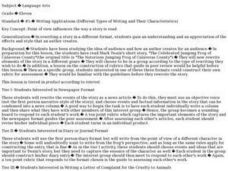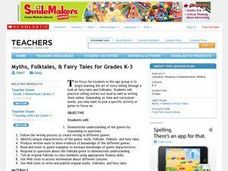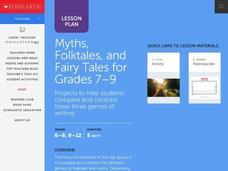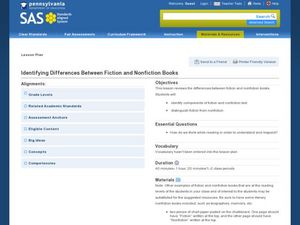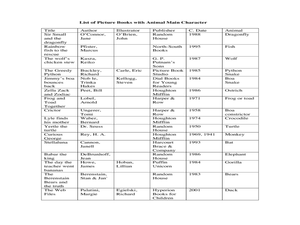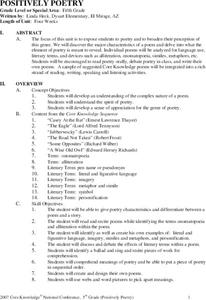Curated OER
Characteristics of Nonfiction
The second lesson in a series from ReadWorks.org, this lesson continues to explore the difference between fiction and nonfiction texts. The lesson opens with the teacher reviewing a class Venn diagram started in the last lesson....
Curated OER
Genre Lesson: What is a Mystery?
Students identify the characteristics of the genre of mystery. In this genre lesson, students discover the elements of a mystery story and begin recording the elements on a class chart of the book entitled Two-Minute Mysteries: The...
Curated OER
Fantasy
How do you know the book you are reading is a fantasy? Explore the characteristics of the fantasy genre as you read the story Zathura with your class. Together you'll create a class chart that identifies the fantasy genre while building...
Curated OER
Writing Applications: Different Types of Writing and Their Characteristics
Twelfth graders rewrite a story in a different format to understand the effects of the author's style. In this writing style lesson, 12th graders read Mark Twain's "The Celebrated Jumping Frog of Calaveras County" and rewrite the...
Curated OER
Music Around the State: Sound and Place
Students identify and interpret the styles and elements of music in three major folk regions of Louisiana within specific traditional music genres. Then they hear the diversity of music in the state and identify the major genres of...
Curated OER
Myths, Folktales, & Fairy Tales for Grades K-3
Have your class explore the art of storytelling through this lesson plan on fairy tales and folktales. Learners interact with a variety of fairy tales and folktales. They practice telling stories out loud as well as writing their own....
Curated OER
Understanding Genres
Young scholars identify genres of literature. In this literature instructional activity, pupils read definitions of the various genres. Young scholars choose books and list clues in the texts that help them identify the appropriate genre.
Curated OER
The Rule of Three
What makes a fairy tale a fairy tale? Teach young readers one characteristic that defines the fairy tale genre. They'll learn that events, objects and characters in fairy tales often occur in threes. They read Goldilocks and the Three...
EngageNY
Preparing to Write Historical Fiction: Determining Characteristics of the Genre
A language arts instructional activity helps young writers identify elements that make up historical fiction. First, it guides them through elements of fictional pieces with vocabulary cards. Then, pupils work collaboratively to...
Scholastic
Myths, Folktales, & Fairy Tales for Grades 7-9
Here is a must-have resource for studying fairy tales, myths, and folktales with your class! It includes instructional ideas, activities, and materials to support a month-long review of these three unique genres of writing.
Curated OER
Lesson 3: Labeled Diagrams
Examine the book Stargazers by Gail Gibbons. Young readers will practice reading and interpreting information from diagrams in this informational text. They work together as a class on this skill and then move into independent...
Smithsonian Institution
American Sabor Crossword
How much do you know about Latin American music? A crossword puzzle challenges learners to answer 24 questions about the history, genres, performers, and instruments of Latin American music.
Curated OER
Writing with Writers
Pupils identify unique characteristics of different writing genres such as biography, folktales and mysteries. They create original piece of writing using the writing process and then post their original writing online. They think...
Curated OER
Identifying Differences Between Fiction and Nonfiction Books
Students explore the differences between fiction and non-fiction book. In this genre study instructional activity, students read examples of fiction and non-fiction and identify the characteristics of each genre. Students list the...
Curated OER
New Information
Young readers explore informational texts as they read a text entitled Giant Pandas by Gail Gibbons. The teacher will begin by explaining that one characteristic of informational texts is that they teach the reader new information...
Curated OER
Find an Animal! Find a Book!
Learners identify the themes of different books by classifying their genre. In this genre lesson, students examine a specific animal by reading both a nonfiction and fiction book about the species. Learners compare the...
Curated OER
Music of My Heart
High schoolers view and discuss the movie, Music of the Heart. They compare/contrast two versions of the song, Music of My Heart, identify characteristics of heroes, and sing the song, Music of My Heart.
Curated OER
Positively Poetry
Students complete a unit on poetry. In this poetry lesson, students complete 19 lessons that focus on reading and writing poetry as well as learning about literary elements and sound devices. Students read poetry orally, debate poetry in...
Curated OER
Lesson 1: Plot Problems
Add another characteristic to your class characteristics of fairy tales chart. First they discuss the concept of problems or conflicts found in most fairy tale plots then they practice identifying conflict as they read. They read...
Curated OER
Lesson 3: Character Values
A value is something a person or character thinks is right or good; it's also a characteristic of a fairy tale. Learners discuss how fairy tale characters often have or exemplify a specific value. They compare the values found in The...
Syracuse City School District
Literary Elements
Address the literary elements in a piece of writing using these materials. The packet includes plenty of resources, and focuses mainly on theme, character, and point of view, with some materials for setting, symbolism, and author's...
Curated OER
Ingredients of a Mystery
Students explore the concept of mysteries. In this mystery genre lesson, students identify the common characteristics of mystery books and use a story map to identify these characteristics in a given book. Students also...
Pennsylvania Department of Education
Comparing Key Ideas and Details in Fiction and Nonfiction
Learners recognize the differences between fiction and nonfiction texts. For this genre study lesson, students discuss what nonfiction means and write the definition. Learners listen to a read aloud and vote whether the text is fiction...
Midwest Clinic
Latin Rhythms: Mystery Unraveled
There is an indescrible energy to Latin American music—but if you know your music theory, it's not so indescrible after all. A thorough packet provides definitions for terms like bolero, charanga, shekere, and tumbao before listing...



